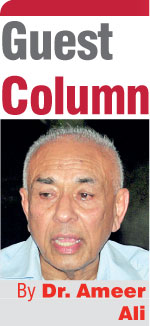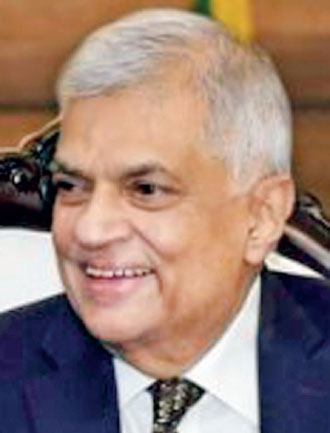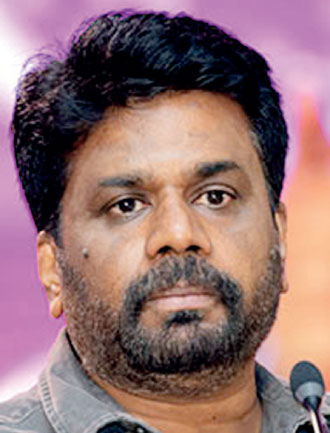Monday Feb 16, 2026
Monday Feb 16, 2026
Wednesday, 31 January 2024 01:43 - - {{hitsCtrl.values.hits}}
|
 President Ranil Wickremesinghe addressing the International Customs Day celebrations had once again thrown the gauntlet at all political parties and challenged them to put forward a better and alternative agenda to the current IMF designed economic revival program. In his address, he obviously omitted to utter even one word about the extent of economic hardship endured by a vast majority of the people as a result of implementing IMF recommendations. Since, like the IMF, RW also believes the hardship is a short term pain worth enduring to achieve long term gain. But, who gains at the cost of whose pain is left unsaid. This address, like several of his in recent months, was obviously driven by RW’s political desire to discredit the Opposition before declaring the date for the Presidential poll at which he would be a contestant.
President Ranil Wickremesinghe addressing the International Customs Day celebrations had once again thrown the gauntlet at all political parties and challenged them to put forward a better and alternative agenda to the current IMF designed economic revival program. In his address, he obviously omitted to utter even one word about the extent of economic hardship endured by a vast majority of the people as a result of implementing IMF recommendations. Since, like the IMF, RW also believes the hardship is a short term pain worth enduring to achieve long term gain. But, who gains at the cost of whose pain is left unsaid. This address, like several of his in recent months, was obviously driven by RW’s political desire to discredit the Opposition before declaring the date for the Presidential poll at which he would be a contestant.
All opposition parties without exception have accepted the fact that to reject the IMF totally would be financially suicidal, as it would jeopardize, firstly, the desperately needed flow of foreign capital for investment, and secondly, the scheduled foreign debt restructuring negotiations with state and private creditors. However, with an eye on the vote bank all major parties and their coalition partners are promising to renegotiate with the IMF a few of the items in the agenda without naming them, so that their implementation becomes less onerous to Sri Lanka’s consumer public. All political parties including the left-oriented National People’s Power (NPP) would also agree with RW that economic recovery would have to be achieved through a competitive market, production of an exportable surplus, and increasing the country’s foreign reserves. But how to achieve these objectives with or without the prevailing socio-political paradigm is the challenge facing all of them and it is on that issue the NPP stands out from the rest of the pack, offering a clear choice to voters.
 |
| President Ranil Wickremesinghe |
 |
| Anura Kumara Dissanayake
|
NPP calls for total rejection of old paradigm
NPP is the only party that advocates a paradigm shift through social revolution and believes that unless the prevailing corruption ridden and ethno-religiously circumscribed political and economic infrastructure that has kept the nation disunited, sapped the vitality of its economy for decades before bankrupting it finally to leave it at the mercy of the IMF and foreign powers is removed, there is no long-term solution to Sri Lanka’s poly-crisis. While every party leader including RW believes in preserving the old paradigm with changes in its operational model, only Anura Kumara Dissanayake (AKD) of the NPP is calling for its total rejection and preference for an alternative paradigm that would be politically democratic but secular, economically equitable and corruption free, market friendly without artificial rigidities and culturally inclusive. In fact, AKD is providing a theoretical framework and practical direction to realise the aspirations of a new generation of voters that rose in revolt with an aragalaya demanding “system change” and “No 225”. RW, who stood to benefit from that revolt, betrayed that generation by ending the aragalaya with brute force, and is now taking all precautions to protect himself and the old order he represents through repressive legislations such as, the PTA and OSB. Ironically, these contentious legislations are passed by a House of Representatives in which a significant portion of its members, according to RW himself, ‘could not understand the difference between a sovereign or commercial bond and James Bond’. But the fact of the matter is these semi-literate members are the very product of the prevailing political culture and its ethno-national framework. This is why when RW and his rivals talk about their measures to revive the economy and generate growth without eliminating the basic paradigm one has to accept their words with not a pinch but bags of salt.
IMF assistance, a byproduct of saving capitalist system
NPP like all the other parties is also accommodative of the IMF but with a big difference. That difference arises partly from the contrasting view between the NPP and others regarding IMF’s primary objective in assisting bankrupt economies like Sri Lanka, and partly the IMF’s demand for “reforms in governance”. As regards the IMF’s primary objective, its funding assistance is system biased and not driven by any altruistic motive. The main objective of creating the IMF in the first place was to protect the capitalist system and promote the interests of the capitalist class. Therefore, the resulting economic growth from IMF assistance and advice is a byproduct of saving the capitalist system with its class structure. Brevity prevents explaining at length the systemic bias of IMF policies. However, in an economy like Sri Lanka where the wealth gap between the upper and lower classes is huge the IMF’s pressure on the Government to increase public revenue through broadening the tax structure via higher and more inclusive indirect taxes tantamount to a punishment to the middle and low-income groups that were not party to the bankruptcy in the first place. Therefore, unlike the other parties that are ready to accept IMF’s ideological premises the NPP’s negotiation would entail its preference to restructure the tax scheme to make it more equitable while cleaning tax administration of its systemic and systematic corruption. The IMF has to accommodate the NPP’s approach, because it is one aspect of fulfilling that organisation’s demand for reforms in governance.
Inaction in executing legislation to end corruption
For instance, RW and other party leaders talk of ending corruption merely through passing legislations in Parliament; but in terms of executing those legislations there is total inaction and the status quo continues. How could they end corruption when the corrupt are financing their political campaigns? Has RW initiated any legal action on any of the members in his present Cabinet against whom there is clear evidence of receiving financial kickbacks for issuing contracts? Why is the former Health Minister still in the Cabinet? A recent announcement by another Minister and Cabinet spokesperson to start development projects to boost economic growth via construction of roads and highways smells a rat, because, such projects had earned the notoriety of financially benefitting Government politicians through contracts and kickbacks. The NPP is promising to bring the corrupt before the law and cleanse political management from making shady deals in the name of development. The IMF should welcome this determination. Thus, IMF’s economic agenda would have better success under NPP rule than under other parties.
The NPP also believes that without producing an exportable surplus the country cannot accumulate foreign reserves. But, unlike RW and other parties, the NPP intends that surplus to be produced by a revitalised domestic sector dominated by small and medium scale enterprises rather than by foreign controlled mega enterprises. The Korean Chaebol and Japanese Keiretsu were originally small and medium enterprises that grew into conglomerates today through open competition, innovation and economies of scale. Vietnam is also following in their footsteps. The NPP should be thinking of an industrial model along those lines. Shouldn’t international financiers be interested in investing in such initiatives provided the market is free of artificial rigidities and political interference? This is why the NPP deserves a chance to govern and voters should get rid of their fear of the unknown.
RW’s tears for Palestine a calculated deception to attract votes
RW’s 2048 economic paradise, his half-hearted pronouncements about ethnic reconciliation and his tears for Palestine at the NAM are all a calculated deception to attract votes from the three communities at the next Presidential election. Enough has been said about the first two and let this piece end with a few remarks about the third. While pretending to champion the cause of Palestine at Kampala, RW has dispatched a Sri Lankan Navy vessel to protect ships carrying cargo and weapons to Israel through the Red Sea. How does one reconcile this contradiction? One should not forget that the Israeli consulate in Colombo that remained closed under the Sirimavo Bandaranaike Coalition Government was opened by RW’s uncle JR and when Muslims protested, he asked his Muslim Ministers to quit the Cabinet if they didn’t support his decision. When RW’s Foreign Minister Ali Sabry participated in Israel’s 75th year celebrations in Colombo last year, he didn’t have the guts to speak Truth to Power, at least reminding his hosts about the 75th anniversary of the Palestinian Nakba. Why then is RW’s sudden love towards Palestine? Obviously, to attract Muslim votes at the forthcoming Presidential election. The poor Foreign Minister of Palestine Riyad al-Maliki who thanked RW for that speech didn’t know that RW is an old fox in politics and that his speech was all razzmatazz with a different agenda.
(The writer is attached to the Murdoch Business School, Murdoch University, W. Australia)